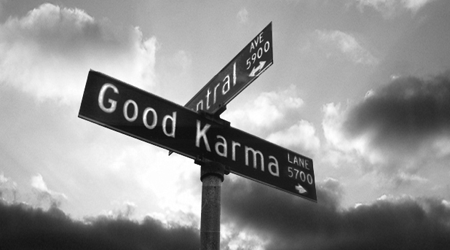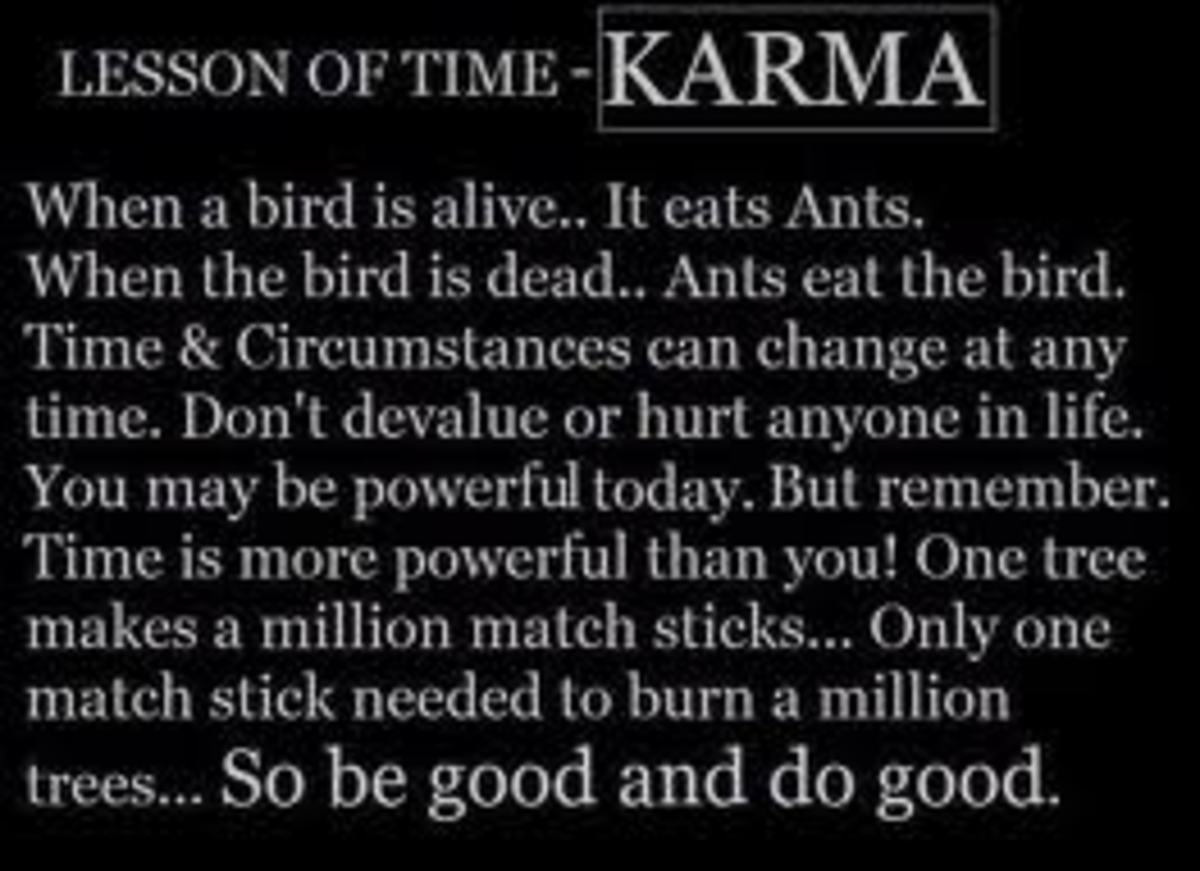Karma Unfolded
Introduction
This Hub is in response to the question posted by Jeff Berndt, “Can you explain the concept of Karma?” The link to the question itself as well as the responses received is given below.
http://hubpages.com/question/173794/can-you-explain-the-concept-of-karma#answer500157

What I Have Come to Believe About Karma
I did not grow up with the concept of karma. I grew up attending a small Baptist church where my Grandmother drove her 1974 brown Monte Carlo every Sunday. My parents were married in that church, but after their divorce I only attended in the summer when I was visiting my father. I have many memories of sitting in the back of that Monte Carlo and driving to Sunday school with my Grandmother, her consistently thanking the Lord for all the green lights she encountered along the way. My father however instilled in me that I should seek my own truths, and not that my Grandmother was wrong, but that she sought her truth, and her truth she found in that small Baptist church.
While my truths I am still discovering, I have however along the way come to believe that there is rhyme and reason to the universe, and that as a requisite for being a part of that universe, we also have to bear the consequences of what we create. The idea that these consequences, or karma, worked on the notion of right and wrong seemed plausible. If I do something because I believe it is right, then good consequences will follow. If I do something that is wrong, then in turn somehow I will be wronged. But having read before that karma works in a manner where the values that we have assigned to right and wrong are inconsequential, it instead acting on intentions and consequences, was always something that I had questioned. As certainly there is a difference between right and wrong, and why wouldn’t that carry over? If I have done something 'right', how could it possibly be construed as 'wrong'? But whose ‘right’ is it?
If a person moves forward with an action believing that it is utterly and completely the ‘right’ thing to do, but if that ‘right’ thing has the consequences of wronging someone else, then the final outcome of that move is ultimately an adverse consequence that will in turn roll back around to its creator. It does make the concept a bit more involved than simply just acting because you believe you are doing the right thing, and then expecting to be rewarded with good consequences. But as Jewels noted in part of her response to this question: “...cause and effect, right and wrong, intentions and consequences. Right and Wrong - by who’s standards and are the consequences of a good intention satisfactory to the giver and receiver; both or neither. And who is the judge that balances the negative and positive karma ledger?”
This would seem to give the impression that you really need to have a complete sense of what you are putting into the universe before you do so. But it would become very overwhelming very quickly if one was to be in a constant mode of considering the implications of every move they were to make at every moment, and what the possible implications could be. I believe that is where intentions and motivation also come in. If your intent and motivations are genuine and seeded with the resolve of decency, then you are moving with good purpose, and I think that you are also then drawing that good back onto yourself in doing so. To move with greed, lust, anger or deceit would do the opposite.
What you put in is what you get out. This gives us the notion that by our every move we are creating. We are shaping the world that surrounds us every day, simply by being in it. And if your thoughts and actions consider the good will of yourself and others around you as you move, then that good will has no other option but to return back to you. If on the opposite hand, your motivations are of ill will, then that is what you yourself will eventually receive. To treat others as you yourself would want to be treated can hold no greater meaning, as the universe can only return to you what you have instilled in it. So who then balances this ledger and by whose standards are the consequences of good intent measured?
I would argue that there is no ledger per se. I think that once an action has been performed, the effects are instantaneous. What’s done is done and all that is left to do for those involved is react. Instead of a ledger, I would more describe it as a continuous chain of reactions. Those reactions and the ripples they create as they travel to the edge of their pond and back, will eventually return to envelop the architect that set them in motion. What they envelop their architect with may depend on several things. My guess would be the intent of the action, how the action was received as it traveled, and what the consequences of the action were. And how much time that trip can take may vary greatly as well. Some will contend to instant karma, while others say that it can take a multitude of lives to balance karmic obligations.
But if in my argument there is no karmic ledger to balance, by whose measuring stick then are these actions judged? Who measures the difference between intent of good will versus one of ill will? Well, I would argue that we do. As we are in a continual state of creating the existence that surrounds us, we are also ultimately the receivers of those creations. We create, we receive, we judge, and then we act on those judgments. If someone helps me, or passes by and decides not to, who else is going to judge their action towards me but me? In turn, if I decide to help someone, who is ultimately going to determine if my effort was really of assistance, the receiver of that assistance. From the moment the action begins, those who receive its effects are its judge.
I believe we are all intertwined and we are all the architects of our own existence; however this is an existence that we all share, and that is what I believe karma is. It is a way to hold us accountable for what we contribute in to that existence. And being an existence that we share, I think we are all ultimately the judges of how we are faring. Are we creating with good intention, where good encapsulates an outcome that is good for others, good for the moment and good for ourselves, or are we moving forward with motivations that more resemble the thoughts and actions of being self-absorbed? I think karma will tell us.









